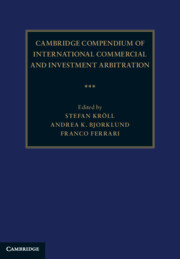Book contents
- Cambridge Compendium of International Commercial and Investment Arbitration
- Cambridge Compendium of International Commercial and Investment Arbitration
- Copyright page
- Contents
- Figures
- Tables
- Contributors
- Preface
- Part I Foundations
- Part II Public Law Questions Relating to Arbitration
- Part III Stakeholders in Arbitration
- Part IV Applicable Law
- 16 International Commercial Arbitration and Private International Law
- 17 Lex Arbitri and the Rules of Procedure
- 18 Applicable Law in Commercial Arbitration
- 19 Applicable Law in International Investment Arbitration
- 20 The Emergence of Soft Law as an Applicable Source of Procedural and Substantive Law
- 21 Mandatory Law: International Commercial and Investment Treaty Arbitration
- 22 Applicable Ethical Framework in Commercial and Investment Arbitration
- Part V Jurisdiction of the Arbitrator
- Part VI The Arbitral Tribunal
- Part VII Procedural Questions in Arbitration
- Part VIII Role of State Courts in Arbitration
- Part IX Awards
- Part X Post-Award Issues
- Part XI Legal Concepts
- Part XII Areas of Concern
- Part XIII Arbitration and Related Fields
- Part XIV EU Law and Arbitration
21 - Mandatory Law: International Commercial and Investment Treaty Arbitration
from Part IV - Applicable Law
Published online by Cambridge University Press: 18 February 2023
- Cambridge Compendium of International Commercial and Investment Arbitration
- Cambridge Compendium of International Commercial and Investment Arbitration
- Copyright page
- Contents
- Figures
- Tables
- Contributors
- Preface
- Part I Foundations
- Part II Public Law Questions Relating to Arbitration
- Part III Stakeholders in Arbitration
- Part IV Applicable Law
- 16 International Commercial Arbitration and Private International Law
- 17 Lex Arbitri and the Rules of Procedure
- 18 Applicable Law in Commercial Arbitration
- 19 Applicable Law in International Investment Arbitration
- 20 The Emergence of Soft Law as an Applicable Source of Procedural and Substantive Law
- 21 Mandatory Law: International Commercial and Investment Treaty Arbitration
- 22 Applicable Ethical Framework in Commercial and Investment Arbitration
- Part V Jurisdiction of the Arbitrator
- Part VI The Arbitral Tribunal
- Part VII Procedural Questions in Arbitration
- Part VIII Role of State Courts in Arbitration
- Part IX Awards
- Part X Post-Award Issues
- Part XI Legal Concepts
- Part XII Areas of Concern
- Part XIII Arbitration and Related Fields
- Part XIV EU Law and Arbitration
Summary
This Chapter addresses how unexpected restrictions in municipal laws might frustrate parties’ autonomy by the application of “mandatory laws” that do not constitute fundamental principles of morality and justice. The Chapter analyses the definition of “mandatory law” and concludes that international commercial arbitration tribunals must follow the combined guidance of the ILA Final Report, with its emphasis on identification of “mandatory laws” as lois de police, and Article 9 of Rome I, with its limitation on applying only “overriding” mandatory laws – particularly when the allegedly mandatory laws of a third State are in question.
The Chapter also examines investment treaty disputes, where the application of mandatory laws of third States is less likely to be involved. However, treaty arbitrators are arguably in need of guidance from States and investors – perhaps as a prudential limit to arbitrators’ discretion – in assessing which of the increasing number of human rights provisions should be considered “mandatory law”.ICJ Judge Bruno Simma’s proposal regarding pre-investment “audits” of the law of the host State in relation to human rights is one way to provide such guidance. Absent guidance, uncertainties about the content of “international law” may well create uncertainties about “mandatory law” in investment treaty cases, to the detriment of ongoing public confidence in investor-State dispute resolution.
- Type
- Chapter
- Information
- Publisher: Cambridge University PressPrint publication year: 2023

